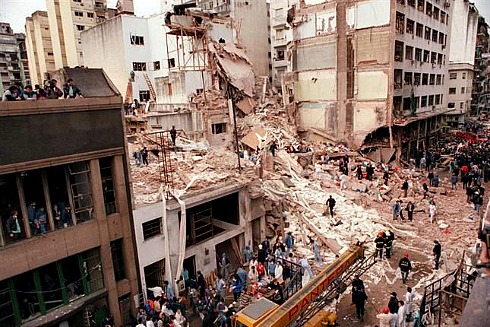Archives
AND MORE...

Bombs & Kooks: A Winning Combo
_____________________

Holier Than Thou
_____________________

Another Day in Centrifuge-Land
_____________________

'Intelligent' Sanctions?
_____________________
June 19, 2013
Résumé of 'Moderate' Mass Murderer
Cleric Hassan Rowhani, the new President-elect of Iran, has been called a “moderate." What that means, we have yet to understand, but below is a piece that may shed some light.
Apparently Rowhani was on the special Iranian government committee that plotted the 1994 bombing of a Jewish community center in Buenos Aires, according to an indictment by the Argentine government prosecutor investigating the case, (see below).
Supreme Leader Ali Khamenei and then-Iranian President Ali Rafsanjani were the ones to make the ultimate decision to go ahead with the attack. And while it is difficult to determine the exact role committee member Rowhani may have played in the bombing, nothing in Rowhani’s background would suggest that he "has any moral qualms about bombing the enemies of the [Islamic] Republic,” according to Iran expert Reuel Gerecht.
Perhaps therein lies the answer? "Hardliners" (e.g., Supreme Leaders & Presidents), make the ultimate decisions to perpetrate mass murders, whereas “moderates,” like Rowhani, are simply complicit in them.
Rowhani will soon be President, so the question is, will he be a hardline mass murderer or a moderate one?
Washington Free Beacon | June 19, 2013
New Iranian President Tied to 1994 Bombing
85 were killed in bombing of Argentinian Jewish Center
By Alana Goodman

The Buenos Aires Jewish center after it was bombed, July 1994 (photo credit: Cambalachero/Wikimedia commons)
Iranian President-elect Hassan Rowhani was on the special Iranian government committee that plotted the 1994 bombing of a Jewish community center in Buenos Aires, according to an indictment by the Argentine government prosecutor investigating the case.
The AMIA bombing is considered the deadliest terrorist attack in Argentina’s history, killing 85 and wounding hundreds more. The Argentine government had accused the Iranian government of planning the attack and Iran’s terrorist proxy Hezbollah of carrying it out. Numerous former and current Iranian officials are wanted by Interpol in connection with the bombing.
Former Iranian intelligence official Abolghasem Mesbahi, who defected from Iran in the late 1990s, testified that the decision to launch the attack was made within a special operations committee connected to the powerful Supreme National Security Council in August 1993.
According to the 2006 indictment, Mesbahi testified that Rowhani, who was then serving as secretary of the Supreme National Security Council, was also a member of the special committee when it approved the AMIA bombing.
“With regard to the committee’s role in the decision to carry out the AMIA attack, Moghadam stated that this decision was made under the direction of Ali Khamenei, and that the other members of the committee were [then-Iranian president Ali Akbar Hashemi] Rafsanjani, Mir Hejazi, Rowhani, Velayati and Fallahijan,” the indictment says.
Supreme Leader Ali Khamenei led the special committee, according to the indictment, and Khamenei and Rafsanjani made the ultimate decision to go ahead with the attack.
While Rowhani was allegedly present for deliberations about the planned bombing, it is highly unlikely he would have had approval authority, according to Iran experts.
“Rowhani’s power at that time comes directly from one individual, and that’s Rafsanjani,” said Reuel Gerecht, a senior fellow at the Foundation for Defense of Democracy.
“As far as that bombing was concerned, because Rafsanjani had to give his approval for that, there was no doubt Rowhani was aware of it, and obviously his approval’s not necessary,” Gerecht continued. “He’s a subordinate. But he certainly would have been aware of all the discussions that led to the attack.”
Rowhani has been portrayed as a moderate reformer by the media and some Iranian regime supporters despite his close relationship with Iran’s Supreme Leader Khamenei. Rowhani also supported deadly crackdowns on student protesters in 1999, and claimed that he deceived the West into allowing Iran’s nuclear program to progress while serving as Iran’s nuclear negotiator with the Europeans.
Gerecht said it is difficult to determine exactly what role Rowhani may have played in the AMIA bombing without being privy to the actual deliberations. But he added that there was “nothing in Rowhani’s background that would suggest to you he has any moral qualms about bombing the enemies of the [Islamic] Republic.”
“In all probability, we would have heard about it if [Rowhani] had risen up [at the meeting] and said ‘Don’t do that, it’s a disgrace,’” said Gerecht. “We would have known that.”
Original article here.
Log In »
Notable Quotables
"Mr. Netanyahu is one of the most media-savvy politicians on the planet. On Friday he appeared live via video link on 'Real Time with Bill Maher,' taking the host’s alternately sardonic and serious line of questioning with gazelle-like alacrity."
~ Anthony Grant, jourrnalist who has written for many major newspapers and worked in television at Paris and Tel Aviv, interviewing former PM Benjamin Netanyahu on Monday, at the outset of Mr. Netanyahu's new book (more here).


